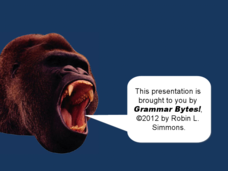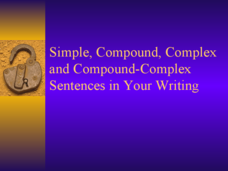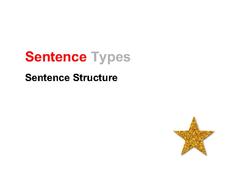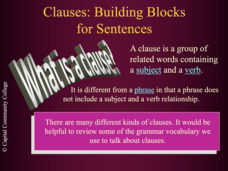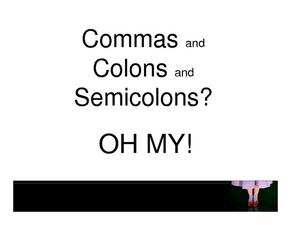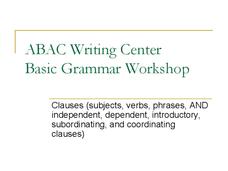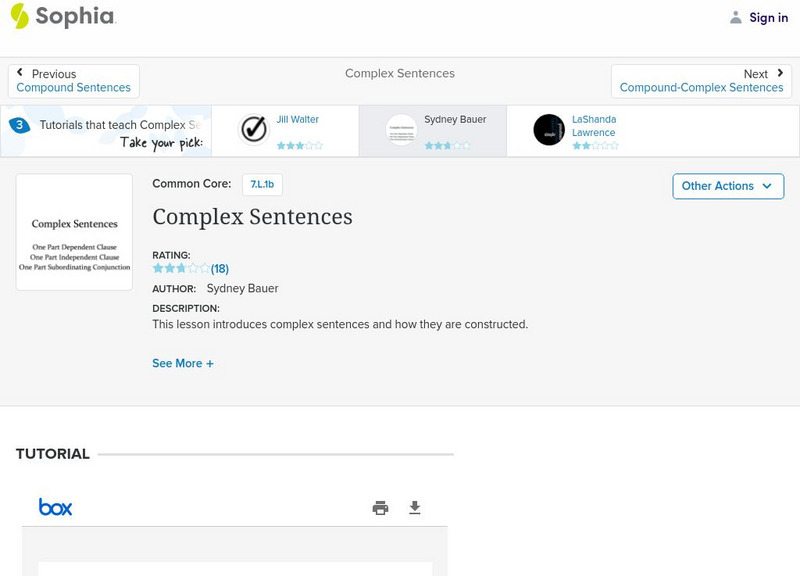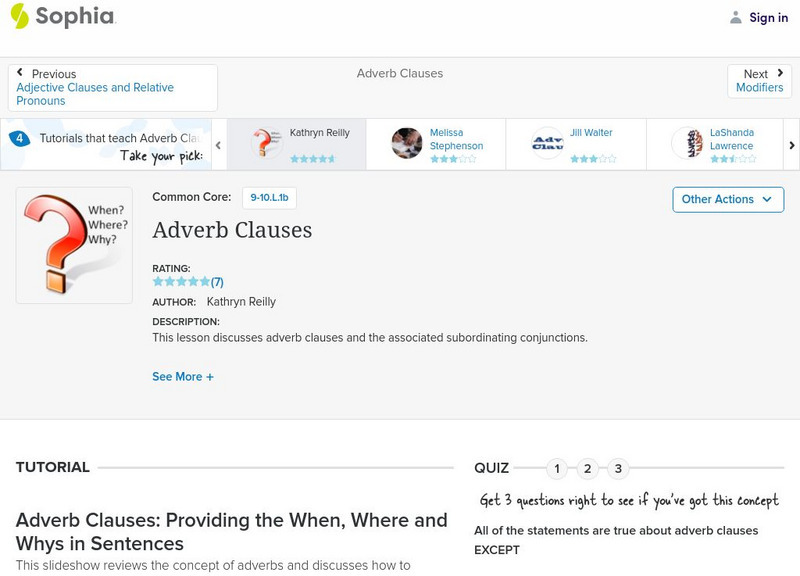Curated OER
Grammar Bytes: Coordination and Subordination
For high school students, this resource could provide a quick and easy way to review sentence structure. The grammar presentation focuses on the use of main and subordinate clauses. It could be used as a test preparation tool.
Curated OER
Simple, Compound, Complex, and Compound-Complex Sentences in Your Writing
Have you ever graded a stack of essays that felt like a series of bland simple sentences? A helpful grammar presentation will help learners spice up their writing by varying their sentence style, making them stronger and more...
Curated OER
Conjunctions
Coordinating, correlative, and subordinating conjunctions are the focus of a short presentation about this part of speech. Terms are defined and models given.
Curated OER
Simple, Compound, and Complex Sentences
Guide young grammarians through common sentence structures with a helpful slideshow presentation. Focusing on coordinating and subordinating conjunctions, the presentation helps individuals to see the elements that make up...
Curated OER
Simple, Compound, Complex, and Compound-Complex Sentences in Your Writing
Encourage your young writers to make their writing more interesting by varying their sentence structures. Each color-coded slide offers definitions and models of sentence forms. The final slide in the presentation presents viewers with...
Curated OER
Phrases and Clauses
Clarify the different types of phrases and clauses that young writers can use to vary their sentence structure. A helpful slideshow presentation encourages your class to fix sentences by adding more interesting phrases and clauses,...
Curated OER
Clauses: Building Blocks for Sentences
Colorfully animated and packed with engaging examples, this PowerPoint encourages to employ clauses to create a variety of sentence structures. Peer editing of sample paragraphs would provide an opportunity for guided practice with...
Curated OER
Commas and Colons and Semicolons? OH MY!
Take a close look at both the definitions and uses of commas, colons, and semicolons. Commas set off clear parts of sentences, colons come before an explanation, and semicolons join two complete thoughts. Review these types of...
Curated OER
Clauses
Look at the basic parts of a sentence with your class. Definitions of the subject, verb, and various clauses are all included. Clear, succinct examples are given in this thorough presentation. A great way to start off grammar with your...
Curated OER
Pesky Punctuation 1: The Comma
From the purpose of punctuation to its proper uses, guide your learners with this presentation. Great visuals dissect sentences to show where a comma belongs and the different parts of a sentence. Help your class use commas only when...
Curated OER
Fragments: Pretenders - Not Really Sentences
Give your class a concise overview of sentence fragments and how to repair them. This simple, not-too-long PowerPoint reinforces the idea that a correct sentence needs a subject and a verb and must be a complete thought.
Curated OER
Sentence Structure: Sentence Types
Sixth graders identify parts that make up different types of sentences with a grammar presentation. The last few slides prompt learners to complete 10 exercises in which they indicate whether each sentence is simple, compound,...
Curated OER
The Writing Center: Prepositions
While the focus is applicable to middle schoolers, high schoolers, and higher education, the slides are text heavy (as they were originally designed for higher education). Learners will review rules for using a preposition and how to use...
Curated OER
Prose Styles: Tough, Sweet, and Stuffy
Take a walk on the rhetorical side with this presentation, which discusses three styles of prose: tough (ethos), sweet (pathos), and stuffy (logos). The slide show provides thorough definitions and examples of each style, as well as...
Sophia Learning
Sophia: Conjunctions: An Introduction
This slideshow lesson focuses on conjunctions; it defines conjunctions. It explains each of the three types of conjunctions: coordinating, subordinating, and correlative. It defines each, lists the conjunctions, and provides sentences...
Sophia Learning
Sophia: Subordinating Conjunctions
This lesson introduces subordinating conjunctions and goes over how they can be used.
Robin L. Simmons
Grammar Bytes: Presentations: Coordination and Subordination Power Point
A PowerPoint slide explaining the use of coordinate and subordinate conjunctions to join clauses. Questions that may be found on standardized tests are included.
Sophia Learning
Sophia: Adverb Clauses
This slideshow focuses on adverb clauses; it reviews adverbs. It defines adverb clauses, explains how to create them using examples, and provides a list of subordinate conjunctions that often begin adverb clauses.
Sophia Learning
Sophia: Complex Sentences
This slideshow lesson focuses on complex sentences; it explains what makes up a complex sentence: independent clause, dependent clause, and a subordinate conjunction. It discusses placement, order, and how to punctuate them accordingly.
Sophia Learning
Sophia: Conjunctions: An Introduction
This lesson introduces coordinating, subordinating, and correlative conjunctions.
Sophia Learning
Sophia: Correcting Sentence Fragments
This slideshow lesson focuses on sentence fragments and how to correct them. It defines fragments, gives two methods for identifying them, provides various ways to correct them with examples, and discusses subordinators and fragments...
Sophia Learning
Sophia: Adverb Clauses
This lesson discusses adverb clauses and the associated subordinating conjunctions.
Sophia Learning
Sophia: Compound Complex Sentences
This slideshow lesson focuses on compound complex sentences. It explains what they are including the requirements, how they are put together, how to punctuate them, and provides examples showing the various sentence structures.
Sophia Learning
Sophia: Beginning Sentences With "But", "And", or "Because": Lesson 3
This lesson goes over how to begin a sentence with 'but', 'and', or 'because'. It is 3 of 4 in the series titled "Beginning Sentences with "But", "And", or "Because"."
